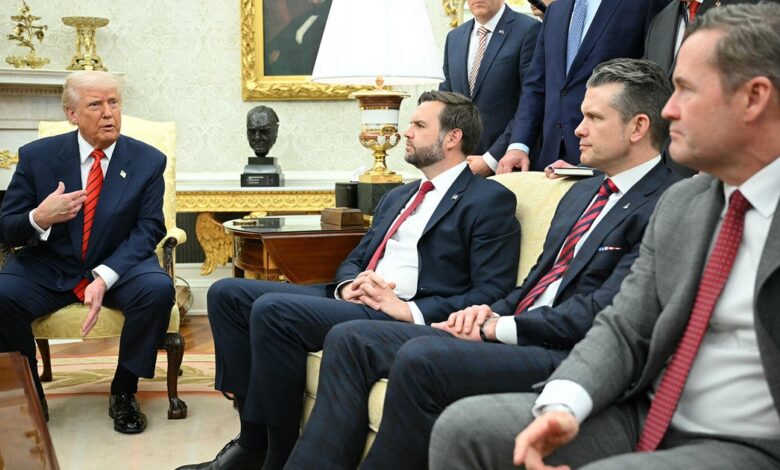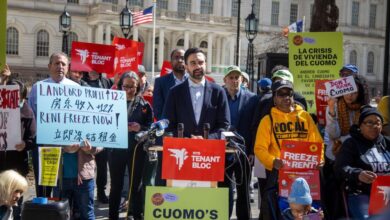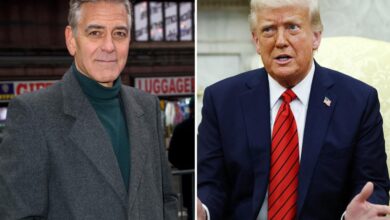Which Trump officials were in the Signal chat? Here’s who was in the group The Atlantic editor was added to

Mark Schiefelbein / AP
Vance expressed concerns about the potential consequences of the attack against the Houthis, warning that it could lead to a significant increase in oil prices and negatively impact the United States economy. His reservations were noted by other officials in the chat, but ultimately the decision to proceed with the attack was made by higher-ranking officials.
Other Officials
In addition to Waltz, Hegseth, and Vance, the Signal chat also included the names or initials of 15 other Trump administration officials. These individuals held various positions within the administration, including roles in the State Department, the Department of Defense, and the National Security Council.
While the leak of the Signal chat raised concerns about the security of sensitive information within the administration, it also shed light on the internal discussions and decision-making processes that take place within the highest levels of government.
Conclusion
The revelation of the Signal chat and its contents has sparked a wave of controversy and scrutiny within the Trump administration. The involvement of high-ranking officials such as Waltz, Hegseth, and Vance in the planning of a military operation against the Houthis in Yemen has raised questions about the administration’s approach to national security and foreign policy.
As the Defense Department’s Office of Inspector General investigates the incident, the public will be looking for answers regarding the handling of sensitive information and the decision-making processes that led to the leak of the Signal chat. The fallout from this incident could have far-reaching implications for the Trump administration and its national security team.
Vice President JD Vance finds himself embroiled in controversy following revelations from a chat where he expressed concerns about a planned military operation. In the chat, Vance’s account indicated that he would support the team’s consensus while suggesting a potential delay of the operation by a month. This revelation comes after The Atlantic published articles that Vance felt misrepresented the situation.
As the Vice President of the United States, Vance holds a significant position in the government hierarchy, being second in line to the presidency. He also plays a crucial role in advising the president on various domestic and foreign policy matters.
CIA Director John Ratcliffe’s involvement in the chat has also raised eyebrows. In his testimony before the Senate, Ratcliffe confirmed his participation in the chat and mentioned that from a CIA perspective, a delay in the operation would not have a negative impact. He suggested that additional time could be used to identify better starting points for coverage on Houthi leadership.
Another key figure in the chat, identified as “TG,” is believed to be Director of National Intelligence Tulsi Gabbard. While Gabbard did not deny her presence in the chat, she stated that she was not directly involved in the discussions regarding attack plans. As the head of the U.S. intelligence community, Gabbard holds a crucial position in overseeing national security interests.
Special envoy Steve Witkoff, who serves as the U.S. special envoy to the Middle East and Ukraine, was also mentioned in the chat. Witkoff’s presence in Russia for a meeting with President Vladimir Putin during the lead-up to the planned operation has raised questions. Sources have indicated that no device carried by Witkoff to Russia had the messaging app Signal installed on it.
Overall, the revelations from the chat involving high-ranking government officials have sparked debates about transparency, communication protocols, and decision-making processes within the administration. The implications of these disclosures are likely to reverberate across the political landscape as more details come to light. White House press secretary Karoline Leavitt provided reporters with important information on Wednesday regarding the communication practices of a government official, Witkoff, during his trip to Moscow. Leavitt clarified that Witkoff did not have access to his personal device or government phone while in Russia. Instead, he was granted access to a “classified protected server” by the U.S. government and was extremely cautious about his communications during his time in the country.
Witkoff himself confirmed this in a social media post on Wednesday, stating that he had no access to his personal devices until he returned from his trip. This precautionary measure highlights the seriousness with which government officials take their communication practices, especially when traveling to potentially sensitive locations like Moscow.
The communication dynamics within the chat group also shed light on the involvement of key government officials in important discussions. Treasury Secretary Scott Bessent, identified as Scott B., had a designated point of contact from the Treasury Department for matters related to the strike. This indicates the level of coordination and oversight required for handling issues such as sanctions.
White House chief of staff Susie Wiles was also listed as a contact in the Signal group, although her contributions were not included in the screenshots published by The Atlantic. As the chief of staff, Wiles plays a crucial role in managing the president’s senior staff and ensuring the smooth execution of his agenda.
The presence of “MAR,” identified as Secretary of State Marco Rubio, in the chat group further underscores the high-level engagement in the discussions. Rubio confirmed his limited contributions to the chat, emphasizing his role in representing the State Department and providing necessary information to the team.
Deputy national security adviser Alex Wong, designated as Waltz’ deputy, was actively involved in coordinating efforts following a meeting in the Situation Room. This demonstrates the rapid response and strategic planning that government officials engage in when faced with critical situations.
Former Green Beret Joe Kent, appointed to lead the National Counterterrorism Center by Mr. Trump, was also part of the Signal chat. Kent was designated as the point of contact for the Office of the Director of National Intelligence, highlighting the interconnected nature of national security efforts.
Other individuals in the chat, such as Brian, Walker Barrett, Jacob, and “SM” believed to be Trump adviser Stephen Miller, played important roles in the discussions. Their participation reflects the diverse expertise and perspectives that contribute to decision-making processes within the government.
Overall, the details revealed in the Signal chat provide valuable insights into the communication practices and collaboration efforts of government officials in addressing complex and sensitive issues. The level of coordination and diligence demonstrated by these individuals underscores the importance of effective communication and strategic planning in ensuring national security and policy implementation.






